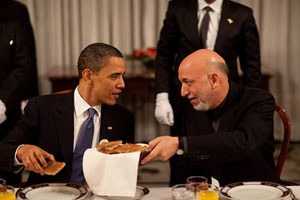Obama’s 2010 Successes and Failures in the Middle East
As the decade draws to a close, it is clear that the bright hopes inspired by Obama’s 2009 Cairo speech have markedly faded, and the disappointments have outweighed achievements in the most important arena for contemporary American foreign policy.The disappointments have outweighed achievements in the most important arena for contemporary American foreign policy.
As 2010 dawned, President Barack Obama had four big issues on his plate regarding the Middle East. These were Iraq, Israel-Palestine, Iran, and Afghanistan. The year has been as unkind to him on those issues as it was with respect to unemployment and the Republican resurgence. As the decade draws to a close, it is clear that the bright hopes inspired by Obama’s 2009 Cairo speech have markedly faded, and the disappointments have outweighed achievements in the most important arena for contemporary American foreign policy. In some important respects, the fault lies with Obama himself for being less a leader than a coordinator.
In Iraq, the U.S. State Department’s hopes that the March 7 parliamentary elections would contribute to national reconciliation between Sunnis and Shiites and form a bridge to a successful American withdrawal have been put in doubt. The Iraqiya Party, headed by former interim Prime Minister Ayad Allawi, had attracted the support of Iraq’s minority Sunnis, and was backed by Saudi Arabia and, initially, the United States. Although it had the largest single number of seats in the new Parliament, it never found enough partners to form a majority.
In contrast, Iran sought to re-create the Shiite majority of past elections by wheedling the Shiite parties into uniting into a postelection grand coalition. In the end, Iran prevailed upon Muqtada al-Sadr, the anti-American fundamentalist cleric, to side with incumbent Nouri al-Maliki, giving him the momentum to attract the support of other Shiites and of the Kurds. Although Maliki will include Sunni Arabs from the Iraqiya Party in his Cabinet, his gaining of a second term can only be interpreted as a solid victory for Iran. The good news is that Maliki has proved relatively decisive and able to command the new Iraqi army.
If Iraq is a mixed picture, Obama’s hopes for a diplomatic breakthrough in the relationship between the Israelis and the Palestinians have thoroughly crashed and burned. The Palestinian leader, Mahmoud Abbas, had insisted that Israel cease pouring colonists into the Palestinian West Bank if he was going to sit at a table and directly negotiate the future of that territory with Prime Minister Benjamin Netanyahu. Otherwise it would be like dickering with a furniture salesman over bedroom suites for a new house even while the salesman’s workers were carting off one piece after another for their own homes. The Israelis agreed to only a 10-month freeze on the start of new colonies, and then only in part of the occupied West Bank.
|
|
When that freeze expired, in the midst of the negotiations, the far right-wing government headed by Netanyahu declined to extend it. Netanyahu probably took heart in defying Obama from the Republican victory in the midterms in the House of Representatives. Obama’s hopes of moving quickly to a two-state solution, or even to concrete preparations for one, have faltered, raising the specter of decades of Israeli apartheid in the Palestinian territories and all the anger and violence that will flow from Palestinian statelessness and consequent lack of basic rights.
On Iran, Obama, having failed to persuade Tehran at the negotiating table to halt its enrichment of uranium, implemented a plan B. His alternative was to ratchet up United Nations financial sanctions. Despite initial resistance from Russia and China, Obama skillfully rallied the U.N. Security Council into voting the increased sanctions on June 9, 2010. Nevertheless, Turkey and Brazil voted against new sanctions, and Lebanon abstained, showing growing unease with punitive policies toward Iran in the global South. While the new sanctions have hurt the Iranian economy, they are unlikely to produce a genuine change in policy or to seriously challenge the regime.
Obama’s surge in Afghanistan has faced more political than military difficulties, but they may be the ones that sink his enterprise. President Hamid Karzai, having blatantly stolen the presidential election in the fall of 2009, has been acting more and more erratically, recently declaring in a private meeting with U.S. commander Gen. David Petraeus that the U.S. was one of Afghanistan’s enemies and that he would have been better off joining the Taliban. The parliamentary elections of this fall were so riddled with fraud that a fifth of the ballots had to be thrown out, and no new Cabinet has been formed. The despised Shiite Hazara ethnic group did disproportionately well, and many Pashtuns (the former ruling ethnic group) feel disadvantaged by the way parliamentary politics have unfolded.
To the humiliation of the administration and of Karzai, a man claiming to be a high-ranking member of the Taliban, who had entered into negotiations with Kabul in return for “a lot of money,” turned out to be a confidence man. A leaked new National Intelligence Estimate by 16 U.S. intelligence agencies found that big chunks of Afghanistan are still at risk of falling to the Taliban, and that rogue cells inside the Pakistani military continue to support some Taliban groups in order to project Islamabad’s authority inside Afghanistan.
This was the year, then, that Iran again won the struggle for influence in Iraq; the year the Israelis sabotaged a revived peace process; the year Iran went on thumbing its nose at the international community with regard to its nuclear enrichment program; and the year that the government in Afghanistan lost a good deal of its credibility. Obama should get credit for good intentions, and talking directly to the major principals. But he appears never to have appreciated the lessons taught by Jimmy Carter at Camp David in 1978, which is that a big geopolitical breakthrough can be accomplished only if the president inserts himself directly into the negotiations and lays his own political capital on the line. Obama has seemed relatively distant from these pressing Middle East issues, and farmed some of them out to subordinates. They are not the sort of problems that can be resolved in that way.
Your support matters…Independent journalism is under threat and overshadowed by heavily funded mainstream media.
You can help level the playing field. Become a member.
Your tax-deductible contribution keeps us digging beneath the headlines to give you thought-provoking, investigative reporting and analysis that unearths what's really happening- without compromise.
Give today to support our courageous, independent journalists.







You need to be a supporter to comment.
There are currently no responses to this article.
Be the first to respond.